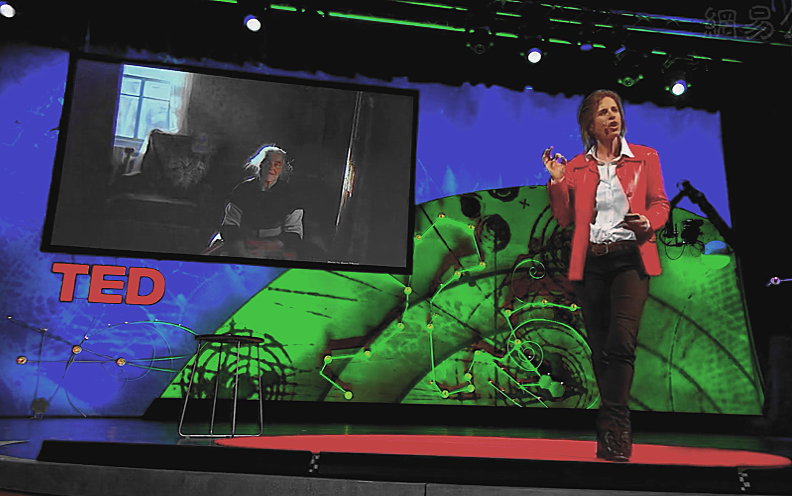Health studies from the region are conflicting and fraught.
針對那個地區做的健康研究都很矛盾又漏洞百出。
The World Health Organization puts the number of Chernobyl-related deaths at 4,000, eventually.
世界衛生組織估計與切爾諾貝利事件相關的死亡人數有4,000人。
Greenpeace and other organizations put that number in the tens of thousands.
綠色和平和其它組織估計有上萬人。
Now everybody agrees that thyroid cancers are sky high,
現在每個人都同意,甲狀腺癌的罹患率奇高,
and that Chernobyl evacuees suffer the trauma of relocated peoples everywhere:
在切爾諾貝利事件中的撤離者飽受重新安置的創傷之苦:
higher levels of anxiety, depression, alcoholism, unemployment and, importantly, disrupted social networks.
更嚴重的焦慮、沮喪、酗酒、失業,還有更重要的是,社交圈瓦解。
Now, like many of you, I have moved maybe 20, 25 times in my life.
現在,就像在座的你們一樣,我這輩子大概搬了 20、25次家,
Home is a transient concept.
家是一種短暫的概念。
I have a deeper connection to my laptop than any bit of soil.
相較于任何一片土地,我和我的筆電有更深刻的連結。
So it's hard for us to understand, but home is the entire cosmos of the rural babushka,
這對我們來說很難理解,但是家的概念就是這群村婦的全世界,
and connection to the land is palpable.
與土地的連結是顯而易見的。

And perhaps because these Ukrainian women were schooled under the Soviets
也許是因為這些烏克蘭婦女在蘇維埃政權下接受教育,
and versed in the Russian poets, aphorisms about these ideas slip from their mouths all the time.
熟讀俄國詩歌和格言,與這些相關的觀念隨時都能輕易地從她們口中頌出。
"If you leave, you die."
“如果你離開,就會逝去。”
"Those who left are worse off now. They are dying of sadness."
“那些離開的人處境每況愈下,他們都悲傷地死去。”
"Motherland is motherland. I will never leave."
“家鄉就是家鄉,我永遠都不會離開。”
What sounds like faith, soft faith, may actually be fact,
那些聽起來像是信念,溫柔的信念,也許才是事實,
because the surprising truth --
因為那些出乎意料之外的真相——
I mean, there are no studies,
畢竟沒有任何研究證明,
but the truth seems to be that these women who returned to their homes
只是真相似乎是,那些回到家鄉的婦女
and have lived on some of the most radioactive land on Earth for the last 27 years,
至今生活在這片全世界最高放射污染的土地上已長達27年,
have actually outlived their counterparts who accepted relocation, by some estimates up to 10 years.
相較于與她們有同樣處境,但是接受安置的人們,她們的壽命預估多于十年。
How could this be?
這怎么可能?
Here's a theory: Could it be that those ties to ancestral soil,
有一個理論是:有沒有可能那些與祖先土地的連結,
the soft variables reflected in their aphorisms, actually affect longevity?
那些在他們的格言中展現的可變因子,其實也影響了壽命?
The power of motherland so fundamental to that part of the world seems palliative.
家鄉的力量對那部分的世界來說如此重要,似乎能夠帶來療愈。
Home and community are forces that rival even radiation.
家與社群是一種力量,即使連輻射都能抵抗。
Now radiation or not, these women are at the end of their lives.
不管有沒有輻射,這些婦女都走到了她們的生命盡頭。
In the next decade, the zone's human residents will be gone,
未來十年,禁區的居民都會過世,
and it will revert to a wild, radioactive place,
這片土地會恢復為荒野,有輻射的地方,
full only of animals and occasionally daring, flummoxed scientists.
只有滿滿的動物和偶爾出現膽大又困惑的科學家。
But the spirit and existence of the babushkas,
但是這些老奶奶的精神與生活方式
whose numbers have been halved in the three years I've known them,
盡管在我認識她們的三年中人數已減少了一半
will leave us with powerful new templates to think about and grapple with,
將留給我們強而有力的新模式,讓我們得以省思,風險的相對涵義,
about the relative nature of risk, about transformative connections to home,
讓我們得以攫取,一種變遷中的家的聯系,
and about the magnificent tonic of personal agency and self-determination.
也讓我們得以反思,并且獲得那滋養個人決心的動力。
Thank you.
謝謝!











